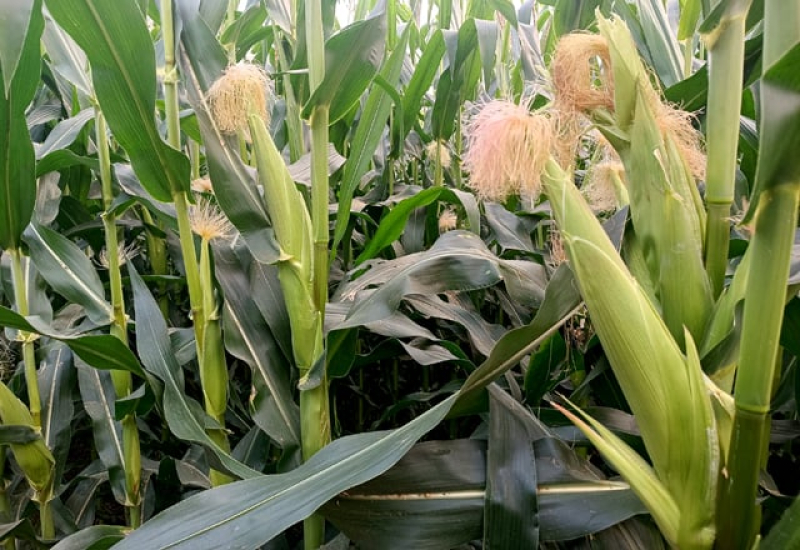- Stocks end week sharply lower as DSE, CSE indices tumble |
- 'Not all collections in the road transport sector is extortion': Sk Rabiul |
- Zubaida, Zaima take iftar with orphan students |
- Dhaka ranks second among world’s most polluted cities Friday |
- Dhaka to maintain ties with all countries with dignity |
Over 7.31-lakh tonnes maize yield expected in Rajshahi

At present, the grassroots farmers are now at the final stage of nursing the growing plants amid the suitable climate conditions everywhere in the region.
Over 7.31 lakh tonnes of maize yield are expected to be produced on 62,225 hectares of land in all eight districts under Rajshahi division during the current Rabi season.
In the previous year, around 5.58 lakh tonnes of maize yield was produced from 52,209 hectares of land in the division.
At present, the grassroots farmers are now at the final stage of nursing the growing plants amid the suitable climate conditions everywhere in the region.
Most of the farming fields now wear eye-catching looks with huge fruit- bearing plants.
Maize farming has been gaining popularity here as many people are seen humming towards the cash crop farming while it has been giving them better
yield and lucrative market price in the region including its vast Barind Mild cold wave sweeping over northern regions may continue
Department of Agricultural Extension (DAE) has set the target of producing around 3.79 lakh tonnes of maize from 32,240 hectares of land in four
districts of Rajshahi Agricultural Zone, while 3.52 lakh tonnes from 29,985 hectares of land in four other districts of Bogura Agricultural Zone.
Shamsul Wadud, Additional Director of DAE, here said diversified steps including distribution of incentives among farmers with providing need-based
training were taken to attain the production target.
He said most of the small and marginal farmers were given seeds and fertilisers free of cost for the maize farming under the government's
agricultural incentive programme.
Shahadat Hossain, a farmer of Chowbaria village under Godagari upazila, said he has brought two and half bighas of land under the maize farming during the
current season.
He is very happy with cultivating various less-water consuming crops like maize.
Hossain said wheat cultivation on per bigha of land needs at least Taka 8,000, and the yield is 14 to 16 maunds. On the contrary, maize farming on
one bigha of land needs Taka 6,500, and the yield is at least 20 to 25 maunds. So, he cultivated maize on 15 bighas of land this season.
Golam Faruque, another farmer of Nandigram village under Durgapur Upazila, has cultivated maize on five bigha of land and some of his cultivated land
has started getting a greenish look with growing plants.
Faruque got 15 to 17 mounds yield from per bigha of land and sells at Taka 600 to 650 per maund in the last harvesting season.
Many other fellow farmers expect better yield as suitable weather prevails here now. Another farmer Karimul Haque of Dharmahata village used to
cultivate Boro paddy during the last 30 years. But, this season, he has cultivated maize on 10 bighas of land instead of Boro paddy.
DAE Deputy Director Mozder Hossain told BSS that maize cultivation both in rabi and kharif seasons in the region has been increasing gradually as the
farmers are showing more interest in this crop cultivation.
But the farmers are now more interested in maize farming just after harvesting the potato in the Kharif-1 season for the last couple of years.
He said there was no scarcity of seeds this time as huge quantities of seeds were distributed among the farmers and they timely completed sowing of maize
seeds.
Chief Scientific Officer of Bangladesh Wheat and Maize Research Institute (BWMRI) Dr Ilias Hossain said maize is being used in preparation of various
nutritional foods like corn-well, corn-flex, poultry and animal feed and fodder and in several industrial products as well.
The demand for the crop is on the rise with the increase of the poultry and dairy farms as it contains huge Vitamin-A, he pointed out.
Dr Hossain said maize is highly beneficial to human health. BWMRI has released five high yielding maize varieties and two of those-BARI Hybrid
Bhutta-12 and 13- are both heat and drought tolerant. So, these are becomingpopular in the growers' level of the region.

